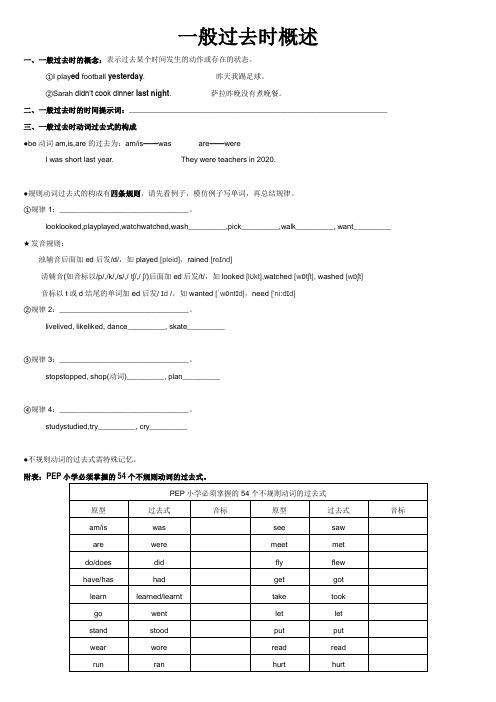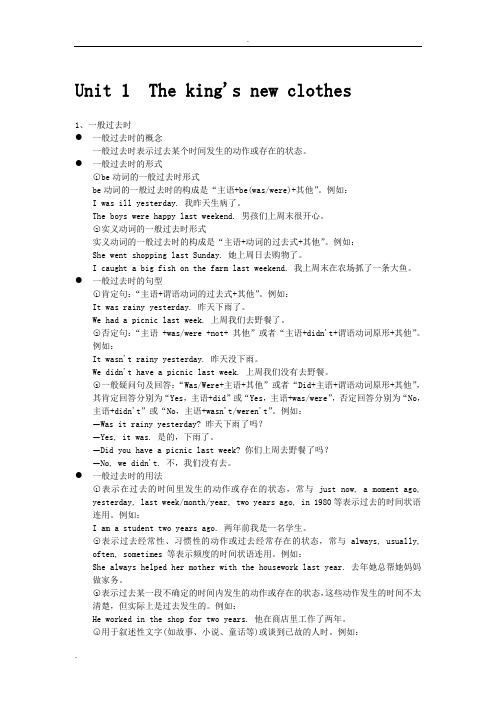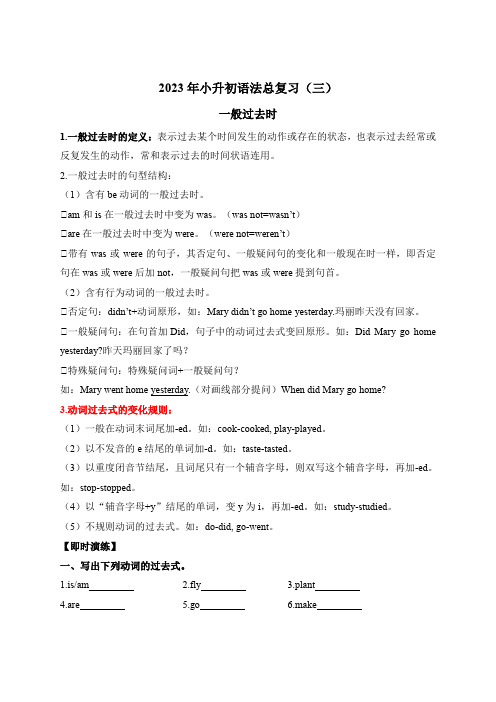小学六年级英语一般过去式发音规则
一般过去时(讲义)-人教PEP版英语六年级下册

一般过去时概述一、一般过去时的概念:表示过去某个时间发生的动作或存在的状态。
①I play ed football yesterday. 昨天我踢足球。
②Sarah didn’t cook dinner last night. 萨拉昨晚没有煮晚餐。
二、一般过去时的时间提示词:______________________________________________________________三、一般过去时动词过去式的构成●be动词am,is,are的过去为:am/is——was are——wereI was short last year. They were teachers in 2020.●规则动词过去式的构成有四条规则,请先看例子,模仿例子写单词,再总结规律。
①规律1:_______________________________。
looklooked,playplayed,watchwatched,wash_________,pick_________,walk_________, want_________ ★发音规则:浊辅音后面加ed后发/d/,如played [pleid],rained [reɪnd]清辅音(如音标以/p/,/k/,/s/,/ tʃ/,/ʃ/)后面加ed后发/t/,如looked [lʊkt],watched [wɒtʃt], washed [wɒʃt]音标以t或d结尾的单词加ed后发/ɪd /,如wanted [ˈwɒntɪd],need ['ni:dɪd]②规律2:_______________________________。
livelived, likeliked, dance_________, skate_________③规律3:_______________________________。
stopstopped, shop(动词)_________, plan_________④规律4:_______________________________。
六年级英语一般过去时的变化规则

六年级英语一般过去时的变化规则The general past tense in 6th grade English can be a tricky thing to master for many students. There are a variety of different rules and exceptions that must be learned in order to properly conjugate verbs and communicate effectively in the past tense. In this essay we will explore the most common past tense changes and provide examples to help solidify the understanding of this important grammatical conceptOne of the most straightforward past tense changes involves verbs that end in the letter "e". For these verbs the past tense is formed by simply adding "d" to the end of the word. For example the verb "love" becomes "loved" and the verb "like" becomes "liked" when conjugated in the past tense. This rule applies to a wide range of common verbs and is a good starting point for understanding past tense changesAnother common past tense change occurs with verbs that end in a consonant followed by the letter "y". For these verbs the "y" is typically changed to an "i" and "ed" is added to the end. For examplethe verb "try" becomes "tried" and the verb "carry" becomes "carried" in the past tense. This is a helpful rule to know as there are many verbs in English that follow this patternVerbs that end in a single consonant followed by the letter "e" undergo a slightly different change when conjugated in the past tense. For these words the final "e" is dropped and "d" is added. For instance the verb "bake" becomes "baked" and the verb "hope" becomes "hoped" in the past tense. This rule has some exceptions however as not all verbs that fit this pattern follow this exact changeIrregular verbs in English are another important consideration when discussing past tense changes. These are verbs that do not follow the standard rules and must be memorized individually. Some common examples of irregular past tense verbs include "go" which becomes "went" "see" which becomes "saw" and "be" which becomes"was/were". Recognizing and properly using irregular past tense verbs is crucial for communicating effectively in 6th grade EnglishIn addition to the specific rules and changes outlined above there are also some general principles to keep in mind when working with past tense verbs. For instance many past tense verbs are formed by adding "ed" to the end of the word. This is the most common and default past tense change. Additionally verbs that end in a vowel sound typically add "d" rather than "ed" when conjugated in the pasttense. Understanding these broader patterns can help students grasp the logic behind past tense changes even when faced with exceptions or more complex verb formsMastering the nuances of past tense conjugation is an important goal for 6th grade English students. By learning the rules for verbs ending in "e" "y" and a consonant "e" as well as recognizing irregular verb forms students can develop a solid foundation for communicating accurately in the past tense. With practice and familiarity these past tense changes will become second nature allowing 6th graders to express themselves with greater precision and fluency in English. The key is to keep these rules and principles in mind while also being prepared to encounter unusual or unexpected past tense verb forms that require additional study and memorization. With diligence and persistence 6th grade students can absolutely become proficient in navigating the general past tense changes in the English language。
小学生如何准确使用一般过去时

小学生如何准确使用一般过去时
一般过去时是英语语法中的一个基本时态,用于表示过去发生的动作、事件或状态,也是英语考试常考的内容之一。
那么小学生如何准确使用一般过去时呢?以下是几点建议。
了解动词过去式
使用一般过去时需要用到动词的过去式,因此小学生需要首先掌握常见动词的过去式。
例如:
- play → played
- eat → ate
- watch → watched
- study → studied
- dance → danced
当然还有不规则动词的过去式,例如:
- be → was/were
- have → had
- go → went
- do → did
- see → saw
小学生可以通过课本、练册等工具研究和记忆这些动词的过去式。
切换思维方式
使用一般过去时需要将思维模式从现在转变为过去。
小学生可以通过以下方式帮助自己切换思维:
- 听老师或其他同学用过去时叙述一些事件或故事
- 阅读课外书籍并用过去时复述故事情节
- 练默写过去时的句子和短文
这样可以帮助小学生熟悉和适应使用一般过去时。
多练
练是掌握任何技能的关键,小学生需要通过大量阅读和写作练来巩固和加深对一般过去时的理解和掌握。
建议小学生可以完成以下练:
- 阅读一些简单的故事或文章,并用过去时复述
- 完成练册中的一般过去时练题
- 写一篇自己的日记,使用一般过去时叙述过去发生的事情
以上是几点帮助小学生准确使用一般过去时的建议。
希望对小学生们的英语学习有所帮助!。
Unit 5 Period 1 Grammar 一般过去时精讲-六年级英语上册精品课堂(牛津上海版)

考点03:一般过去时的结构
Judy is a police officer now.
Judy was a little bunny before.
考点01:一般过去时的用法
He had lunch just now.
She read newspapers yesterday.
用法二:表示过去某一段时间发生的动作或过 去一段时间内经常或反复发生的动作。
考点02:一般过去时的时标
1. yesterday系列 ”昨天“ yesterday(morning/afternoon/evening…) the day before yesterday
考点03:一般过去时的结构
行为动词的一般过去时: 肯定句:主语+动 词的过去式+其他。
行为动词 过去式
She I They
danced played the piano swam
yesterday. five hours ago. three days ago.
即学即练
依时定态 依态定型
√1. She __li_v_e_d__(live) in Beijing last year. √2. There _w__a_s_(be) no one here a moment ago. √3. I listened but __h_e_a_r_d__(hear) nothing.
考点03:一般过去时的结构
I am a police officer now.
Pep版小学英语六年级下册unit3---一般过去时讲解

Pep版小学英语六年级下册unit3---一般过去时讲解一: 定义表示过去某个时间里发生的动作或存在的状态。
常和表示过去的时间状语连用,如:(a moment, two hours) ago,just now,yesterday,last (week, year, month, day),this morning 等。
如:My brother went to school by bike last term.He was a student four years ago.I watched the moon and ate the moon cakes last Mid-Autumn Festival.Jim went to the supermarket yesterday.二:句子结构(1)Be动词的一般过去时态肯定句:主语+ was/were +其他.否定句:主语+ was/were + not +其他.一般疑问句:Was/Were+主语+其他?特殊疑问句:特殊疑问词+was/were+主语+其他?[注:was用于主语是第一人称单数和第三人称单数时;were用于其他人称] 例:I was born in 1989. 我是1989年出生的。
I was not born in 1989. 我不是1989年出生的。
Were you born in 1989? 你是1989年出生的么?(2)实义动词的一般过去时态肯定句:主语+实义动词过去式+其他.否定句:主语+didn’t+实义动词原形+其他.一般疑问句:Did+主语+实义动词原形+其他?特殊疑问句:特殊疑问词+did+主语+实义动词原形+其他?例:Jim goes home yesterday. 吉姆昨天回家了。
Jim didn’t go home yesterday. 吉姆昨天没有回家。
Did Jim go home yesterday? 吉姆昨天回家了么?What did Jim do yesterday? 吉姆昨天干什么了?三:动词过去式变化规则:1.一般情况下在动词末尾加-ed,如:cook-cooked,listen-listened2. 以e结尾的,在词尾加-d, 如:taste-tasted,like-liked3. 以末尾只有一个辅音字母的重读闭音节,双写末尾的辅音字母,再加-ed,如:stop-stopped,plan-planned4.以“辅音字母+y”结尾的,变y为i,再加-ed,如:study-studied5.不规则动词过去式:过去时练习一、写出下列动词的过去式is\am_________ fly_______ plant________ are ________ drink_________ play____ go________ make _____ ___ does_________ dance_______ worry________ ask _____ taste_________ eat__________ draw________ put ______ throw________ kick_________ pass_______ do ________二、用括号词的适当形式填空1. He (live) in Wuxi two years ago.2. The cat (eat) a bird last night.3. We (have) a party last Halloween.4. Nancy (pick) up oranges on the farm last week.5. I (make) a model ship with Mike yesterday.6. They (play) chess in the classroom last PE lesson.7. My mother (cook) a nice food last Spring Festival.8. The girls (dance) at the party last night.9. I (watch) a cartoon on Saturday last week.10. We (go) to zoo yesterday.11 you (visit) your relatives last Spring Festival?12. Gao Shan (pull) up carrots last National Day holiday.13. What she (do) in the garden last morning?She (catch) a beautiful butterfly.14. They (have) a big lunch last Spring Festival.15. Last summer holiday, I (go) to a party. It (be) fun.16. We all (eat) delicious food last week.17. (do) you go to the zoo last Children’s Day?18. you (have) a good time last night?19. What Nancy (do) last Spring Festival?20. What holiday (come) after Christmas?21. I (watch) a dragon boat race just now.22. I t (be) my birthday yesterday, I (have) a good time.23. The students (go) to the supermarket (by) bus yesterday.24. I’ve (get) a wallet from my grandma.25. you (eat) a lot of delicious food last Spring Festival?26.I ______ (watch) a cartoon on Saturday.27. Her father _______ (read) a newspaper last night.28. We _________ to zoo yesterday, we _____ to the park. (go)29. ______ you _______ (visit) your relatives last Spring Festival?30. ______ he _______ (fly) a kite on Sunday? Yes, he ______.一般过去时练习题一、单项选择:从下列各题后所给的四个选项中选择最佳答案填空。
六年级英语一般过去时动词过去式必背知识点

小学六年级英语动词过去式必背知识点规则动词词尾加百度-ed有三种读音:1.在清辅音后读作[t]。
如:asked,helped,watched,stopped2.在浊辅音和元音后读作[d]。
如:enjoyed,studied,moved,called3.在t/d后读作[id]。
如:wanted,needed动词过去式变化形式:规则动词的过去式由“动词原形+-ed”构成,具体变化有:1.直接在词尾加-ed。
如:want—wanted,work—worked,need—needed,clean—cleaned2.以不发音的e结尾的在词尾加-d。
如:like—liked,live—lived,use—used,move—moved3.以一个元音字母加一个辅音字母结尾的重读闭音节动词,先双写结尾的辅音字母,再加-ed。
如:stop—stopped,trip—tripped4.以辅音字母加y结尾的动词,先把y变成i,再加-ed。
如:study—studied,carry—carried, hurry—hurried,marry—married不规则动词的过去式大体上归纳有以下六条记忆法:1.以t结尾的词,过去式与原形相同。
如:put—put,let—let,cut—cut,beat—beat2.以d结尾的词,把d变成t。
如:build—built,lend—lent,send—sent,spend—spent3.以n结尾的词,在词后加t。
如:mean—meant,burn—burnt,learn—learnt4.以ow/aw结尾的词,把ow/aw变成ew。
如:blow—blew,draw—drew,know —knew,grow—grew5.含有双写字母的词,将双写改为单写,在词尾加t。
如:keep—kept,sleep—slept,feel —felt,smell—smelt6.含有元音字母o/i的词,将o/i变成a。
新版PEP小学六年级英语下Unit2-复习(一般过去时)

What did she do?
She cooked a big meal.
What did he do?
He painted a picture.
Was the man at home yesterday?
No, he wasn’t . He was in the classroom.
Were they in the park?
What did the boy do after school yesterday ?
He played football.
What did he do after class yesterday?
He played basketball.
What did the man read?
He read newspapers.
Yes, they were.
Did the boy play basketball yesterday afternoon?
No, he didn’t . He played football.
Did the man cook breakfast this morning?
Yes, he did.
5. I ____(see) a film with Ann yesterday.
2. She _____ (be) at school this morning.
4. He _____ (do not) live in Guangzhou before 2000.
Exercise
1. _____(be) you busy yesterday afternoon?
Did she…?
Yes, she did.
小学六年级英语——一般过去时 (1)

将下列动词变为过去式
1. look looked 2. live lived 3. stop stopped 6. trip tripped
4. carry carried 5. hope hoped 7. call called 10.are were 13.do did 16.say said
时态转换练习
把下列句子改成相应时态
1. He usually gets up early in the morning. got up But________late today. 2. She usually works from 8 a.m. to 5 p.m. she worked from 8 a.m. to 6 p.m But yesterday __________________________. They often go to the park on Sundays. 3. _______________________
stop trip
study worry
规则动词过去式词尾-ed的读音
读音规则 在浊辅音和元音 后面 读 音 例 词 moved /mu:vd/
/d/
在清辅音和元音 后面
/t/
passed /pa:st/
在浊பைடு நூலகம்音后面
/id/
needed /’ni:did/
Infinitive
1. am is 2. are 3. begin 4. break 5. bring 6. build 7. buy 8. can
Did you ____________(remember) remember 1. _____ to buy the oranges?
六年级上册英语知识点归纳

Unit 1 The king's new clothes1、一般过去时●一般过去时的概念一般过去时表示过去某个时间发生的动作或存在的状态。
●一般过去时的形式○1be动词的一般过去时形式be动词的一般过去时的构成是“主语+be(was/were)+其他”。
例如:I was ill yesterday. 我昨天生病了。
The boys were happy last weekend. 男孩们上周末很开心。
○2实义动词的一般过去时形式实义动词的一般过去时的构成是“主语+动词的过去式+其他”。
例如:She went shopping last Sunday. 她上周日去购物了。
I caught a big fish on the farm last weekend. 我上周末在农场抓了一条大鱼。
●一般过去时的句型○1肯定句:“主语+谓语动词的过去式+其他”。
例如:It was rainy yesterday. 昨天下雨了。
We had a picnic last week. 上周我们去野餐了。
○2否定句:“主语 +was/were +not+ 其他”或者“主语+didn't+谓语动词原形+其他”。
例如:It wasn't rainy yesterday. 昨天没下雨。
We didn't have a picnic last week. 上周我们没有去野餐。
○3一般疑问句及回答:“Was/Were+主语+其他”或者“Did+主语+谓语动词原形+其他”,其肯定回答分别为“Yes,主语+did”或“Yes,主语+was/were”,否定回答分别为“No,主语+didn't”或“No,主语+wasn't/weren't”。
例如:—Was it rainy yesterday? 昨天下雨了吗?—Yes, it was. 是的,下雨了。
—Did you have a picnic last week? 你们上周去野餐了吗?—No, we didn't. 不,我们没有去。
六年级 上学期 英语 闽教版(三起点) 一般过去时的概念及用法

一般过去时的概念及用法一、基本概念一般过去时(simple past tense)表示过去某个时间里发生的非持续性动作或存在的状态,也表示经常或反复发生的动作。
用动词的过去式表示,常和表示过去的时间状语连用,如:yesterday,last night,in 1990,two days ago,before,the age of等。
一般过去时也表示过去经常或反复发生的动作,常和often,always等表示频率的时间状语连用。
表示过去习惯性、经常性的动作、行为;过去主语所具备的能力和性格。
二、动词变化1.直接加ed: work—— worked look——looked2.以不发音e结尾的单词,直接加d: live ——lived hope——hoped use——used3.以辅音字母+y结尾的,变y为i加ed: study—— studied carry——carried worry——worried4.以一个辅音字母结尾的,双写最后的辅音字母+ed: stop——stopped plan——planned重读闭音节体现形式为辅-元-辅结构,例如nod, n为辅音,o为元音,d为辅音。
5. 以ic结尾的动词,要把ic变成ick再加ed,如picnic→picnicked,traffic→trafficked6.不规则变化的动词过去式:have---had are---were get---got say---said feel---feltdo/does---did is---was go---went drink--drank eat--ate bring----brought think----thought buy----bought catch---- caught teach ---- taught sit----sat wear----wore cut----cut sweep----swept sleep——slept see----saw become----became read——read7.以辅元辅结尾的加d三、用法(1)一般过去时表示在过去某个特定时间发生,也可以表示过去习惯性、经常性的动作。
译林版英语六年级上册一般过去时的归纳及练习

译林版英语六年级上册一般过去时的归纳及练习一般过去时1.一般过去时表示过去某个时间发生的动作或存在的状态,常和表示过去的时间状语连用。
一般过去时也表示过去经常或反复发生的动作。
2.Be动词在一般过去时中的变化:⑴am和is在一般过去时中变为was。
(was not=wasn't)⑵are在一般过去时中变为were。
(were not=weren't)⑶带有was或were的句子,其否定、疑问的变化和is, am, are一样,即否定句在was或were后加not,一般疑问句把was或were调到句首。
3.句中没有be动词的一般过去时的句子否定句:didn't +动词原形,如:Jim went home yesterday.Jim didn't go home yesterday.一般疑问句:在句首加did,句子中的动词过去式变回原形。
如:Jim went home yesterday.Did Jim go home yesterday?特殊疑问句:⑴疑问词+一般疑问句?如:Jim went home yesterday.Did Jim go home yesterday?What did Jim do yesterday?动词过去式变化规则:1.一般在动词末尾加-ed,如:pull-pulled, cook-cooked2.结尾是e加d,如:taste-tasted3.末尾是辅音字母加一个元音字母和一个辅音字母的重读闭音节,应双写末尾的辅音字母,再加-ed,如:stop-stopped4.以“辅音字母+y”结尾的,变y为i,再加-ed,如:study-studied5.不规则动词过去式:词义现在(原形)是am,是(be)是are (be)成为become开始begin弯曲bend吹blow买buy能can捕捉catch 选择choose 来come切cut做do, does 画draw饮drink过去waswere became beganbentblew bought could caught chosecame cut did drew drank 1吃感觉发现飞忘记得到给走成长有听受伤保持知道研究eatfeelfindfly forget getgivegogrow have, has hear hurt keep know learn atefelt found flewforgotgotgavewentgrewhadheardhurtkeptknewlearned,learnt允许,让letlet 躺lielay制造makemade可以maymight意味meanmeant会见meetmet必须mustmust放置putput读readread骑、乘riderode响、鸣ringrang跑runran说saysaid看见seesaw将shallshould唱歌singsang坐下sitsat睡觉sleepslept说speakspoke度过spendspent扫sweepswept2过去时练习写出下列动词的过去式是\am_____________飞___________找___________是___________吗have_____________ play___________ go______________ lose ________does_____________ dance__________ worry___________ ask ___________taste_____________ eat____________ take____________ see ____________bring____________ kick___________ go____________ do__________Be动词的过去时练习(1)一、用be动词的适当形式填空1.I _______ at school just now.2.He ________ at the camp last week.3.We ________ students two years ago.4.They ________ on the farm a moment ago.5.Yang Ling ________ eleven years old last year.6.There ________ an apple on the plate yesterday.7.There ________ some milk in the fridge on Sunday.8.The mobile phone _______ on the sofa yesterday evening.二、句型转换1. It was exciting.否定句:________________________________________________一般问题:______________________________________肯定回答:_______________________________________2. The students were very excited.否定句:________________________________________________ 一般疑问句:____________________________________________否:______________________________________3. The sweets were in his pocket.否定句:________________________________________________ 一般疑问句:____________________________________________否:______________________________________3Be动词的过去时练习(2)1.用be动词的适当形式填空1.I ______ an English teacher now.2.She _______ happy yesterday.3.They _______ glad to see each other last month.4.Helen and Nancy ________ good friends.5.The little dog _______ two years old this year.6.Look, there ________ lots of grapes here.7.There ________ a sign on the chair on Monday..8.Today _______ the second of June. Yesterday ______ the first of June. It _____ Children's Day.All the students ______ very excited.二、句型转换1. There was a car in front of the house just now.一般疑问句:____________________________________________肯定回答:__________________________________________否定回答:__________________________________________三、中译英1.我的故事书刚才还在手表旁边。
六年级英语知识,动词在时态中的变化

(1)一般情况下,直接加-ed。例:work—worked
(2)以不发音的e结尾,直接加-d。例:live—lived
(3)以辅音字母加y结尾改y为i加-ed。例:cry—cried
(4)以双辅音结尾双写最后字加-ed。例:swim—swimmed
(5)不规则变化。例:see—saw.
六年级英语动词的时态变化
1、动词第三人称单数变化(一般现在时)。
(1)一般情况下直接加-s。例:like—likes
(2)以x,s,ch,sh,o结尾的动词加-es。例:watch—watches
(3)以元音字母加y结尾的动词直接加-s。例:play—plays
(4)以辅音字母加y结尾改y为i加-es。例:study—studies
(5)不规则变化。例:have—has.
2、动词变-ing形式(现在进行时)。
(1)一般情况下,直接加-ing。例:read—reading.
(2)以不发音的e结尾,去e加-ing。例:make—making
(3)以双辅音结尾双写最后字母加-ing。例:run—running
(4)少数以ie结尾,变ie为y,再加-ing。例:lie—lying
4、常见动词的不规则变化
动词原形
过去式
动词原形
过去式
动词原形
过去式
arise
arose
fall
fell
drink
drank
begin
began
get
got
eat
ate
cut
cut
hear
heard
lose
lost
2023年小学英语六年级小升初语法总复习(三)一般过去时 (译林版含答案)

2023年小升初语法总复习(三)一般过去时1.一般过去时的定义:表示过去某个时间发生的动作或存在的状态,也表示过去经常或反复发生的动作,常和表示过去的时间状语连用。
2.一般过去时的句型结构:(1)含有be动词的一般过去时。
①am和is在一般过去时中变为was。
(was not=wasn’t)①are在一般过去时中变为were。
(were not=weren’t)①带有was或were的句子,其否定句、一般疑问句的变化和一般现在时一样,即否定句在was或were后加not,一般疑问句把was或were提到句首。
(2)含有行为动词的一般过去时。
①否定句:didn’t+动词原形,如:Mary didn’t go home yesterday.玛丽昨天没有回家。
①一般疑问句:在句首加Did,句子中的动词过去式变回原形。
如:Did Mary go home yesterday?昨天玛丽回家了吗?①特殊疑问句:特殊疑问词+一般疑问句?如:Mary went home yesterday.(对画线部分提问)When did Mary go home?3.动词过去式的变化规则:(1)一般在动词末词尾加-ed。
如:cook-cooked, play-played。
(2)以不发音的e结尾的单词加-d。
如:taste-tasted。
(3)以重度闭音节结尾,且词尾只有一个辅音字母,则双写这个辅音字母,再加-ed。
如:stop-stopped。
(4)以“辅音字母+y”结尾的单词,变y为i,再加-ed。
如:study-studied。
(5)不规则动词的过去式。
如:do-did, go-went。
【即时演练】一、写出下列动词的过去式。
1.is/am2.fly3.plant4.are5.go6.make7.taste 8.throw 9.ask10.buy 11.bring 12.draw13.kick 14.dance 15.catch16.play 17.drink 18.put二、用所给动词的适当形式填空。
小学六年级英语【一般过去时的用法】

一般过去时的用法一、概念表示在的过去某个时间里所发生的动作或存在的状态。
通常在句子里找到表示过去时间的词或词组。
如:yesterday,yesterday morning,yesterday afternoon,yesterday evening,the day before yesterday(前天),last night,last week,last month,last year,a momentago(刚才),just now(刚才),two days ago,a week ago,in 1990等。
如:I went to bed at eleven last night.昨晚我11:00睡觉。
四、动词过去式的构成规律(一)规则动词的过去式1.一般情况下,在动词原形后面加-ed;look→lookedplay→playedstart→startedvisit→visited2.以不发音e结尾的动词,在词尾直接加-d;live→liveduse→used3.以“辅音字母+ y”结尾的动词,先将y改为i ,再加–ed;study→studied, try→triedfly→flied4.以重读闭音节(即辅音+元音+辅音)或r音节结尾,末尾只有一个辅音字母的动词,要先双写这个辅音字母后,再加–ed。
stop→stoppedplan→planned, prefer→preferred(二)不规则动词的过去式1.改变动词中的元音;begin→begandrink→drankcome→cameeat→ategrow→grewrun→ranknow→kn ewwin→wonspeak→spoketake→tookwrite→wroteget→got2.变词尾的–d为–t;build→builtlend→lentsend→sentspend→spentbend→bent3.与动词原形一样;cut→cutput→putcost→costhurt→hurtshut→shut4.变-ay为-aid (少数动词);say→saidpay→paidlay→laid5.采用不同词根;sell→soldteach→taughtbuy→bought6.其他。
新湘少版六年级英语上册一到四单元知识点

新湘少版六年级英语上册一到四单元知识点一般过去时概念:一般过去时表示过去某个时间里发生的动作或存在的状态.动词过去式变化规则:1.一般情况下,动词词尾加-ed, 如:play—played ask—asked climb-climbed2.以不发音的e结尾的动词,加-d, 如:practise- practiced like—liked3.以“辅音字母+y”结尾的动词,把y改成i, 再加—ed, 如:study—studied try—tried carry—carried4.重读闭音节结尾,且词尾只有一个辅音字母,双写这个字母,再加—ed, 如:stop—stopped plan-planned5.不规则变化:is am—was are—were do—did have—had go—went take—took run—ran see—saw重点短语:1.during the holidays在假期中 2.the new school year新学年 3.talk about谈论4.the summer holidays暑假5.read an English storybook读英语故事书6.play games玩游戏7.play games with my friends和我的朋友玩游戏8.read many books读很多书9.write a little storybook写一小册故事书10.in English用英语11.practise listening练习听力12.read it to us读给我们听听13.learn writing学习写作14.visit my grandparents 看望我的祖父母15.learn words and sentences 学习单词和句子st week上周17. play an interesting game玩一个有趣的游戏18. in class 在课堂上19.stand up起立20.sit down坐下21. take out拿出22.go out of从……出来,离开23.run to跑向24. run around 绕着……跑25.class is over下课26.listen to music 听音乐27.write a story写故事28.go to the beach去海滩29.feel happy感觉开心30.each other互相,彼此31.learn from向……学习32.go to the library 去图书馆33.faster and faster越来越快Unit2 Katie always gets up early.一般现在时:表示经常发生的事情,经常性的动作或一般的事实。
小学英语一般过去时讲解及练习

六年级英语复习(第九课时)一般过去时概念:表示在过去某个时间里所发生的动作或存在的状态。
常见过去时态时间状语:Yesterday_________ yesterday morning/ evening________last night/week/ month/year__________________________ the day before yesterday________just now_____________ two days ago_______a week ago__________in 1990______:例:I went to bed at eleven last night. 昨晚我11:00睡觉。
行为动词一般过去时变化规则1.一般在动词原形末尾加-ed,如:look-looked, play- played2.结尾是e加d,如:live-lived,use-used,hope-hoped3.末尾只有一个元音字母和一个辅音字母的重读闭音节,应双写末尾的辅音字母,再加-ed,如:stop-stopped,plan-planned4.以“辅音字母+y”结尾的,变y为i,再加-ed,如:study-studied5.常见不规则动词一般过去时:am/is→was are→were have/has→had do→didsing→sang sit→sat give→gave run→rancome→came eat→ate take→took write→wrote{ride→ rode drive→drove speak→spoke get→gotgo→went make→made know→knew see→sawteach→taught buy→bought read→read put→puthurt→hurt cut→cut fall→fell say→said句式变化(1) Be动词在一般过去时中的变化①am/is→_________________ 否定形式wasn’t(= was not)②are→__________________ 否定形式weren’t(= were not)③否定句在was或were后加_______,一般疑问句把was或were调到_____。
小学英语六年级下册Unit2过去式

过去式规则动词词尾加ed有三种读音:/d/ /t/ /id/
1.在浊辅音和元音后加ed读 /d/ 例如:played cleaned stayed .... 2.在清辅音后加ed读/t/ 例如:watched stopped 3.在t/d后加ed读/id/ 例如:wanted needed
practice
小学英语六年级下册 UNIT 2 Last weekend Let’s wrap it up
chant
● What did you do? ● What did you do? ● What did you do?
Amy ,Amy,Amy I played a ball. I played a ball.
Last weekend
Amy was busy last weekend.On saturday, She (wash)--- her clothes in the morning.In the afternoon she (clean)---her room.On sunday, she( play)---football in the morning.In the afternoon she (read) ---a book.In the evening she( watch) ---TV. What was a busy weekend.
check
1..在浊辅音和元音后加ed读 /d/ 1.stayed 2.cleaned 3.studied 4.planned 5.lived 6.cried 7.played 2.在清辅音后加ed读/t/ 1.watched 2.stopped 3.watched 4.washed 5.cooked 6.talked 7.liked 3.在t/d后加ed读/id/ 1.needed 2.wanted 3.visited
- 1、下载文档前请自行甄别文档内容的完整性,平台不提供额外的编辑、内容补充、找答案等附加服务。
- 2、"仅部分预览"的文档,不可在线预览部分如存在完整性等问题,可反馈申请退款(可完整预览的文档不适用该条件!)。
- 3、如文档侵犯您的权益,请联系客服反馈,我们会尽快为您处理(人工客服工作时间:9:00-18:30)。
(动词词尾为t,d以外之浊辅音或元音时,发/ d /音。
call →called(叫)stay→stayed(停留)cry→cried(哭)
动词过去式规则
1)一般过去时时间标志语long longago(很久以前), one day(有一天),yesterday(昨天), last night(昨晚), three days ago(三天前)。
2)Be动词在一般过去时中的变化:
am和is在一般过去时中变为was。am,is----was
are在一般过去时中变为were。are-----were
3)动词过去式变化规则:
1.一般在动词末尾加-ed,如:point-pointed,shout-shouted
2.以不发音的e结尾加-d,如:like-liked live-lived
4)过去式“-ed”的发音规则
(1)动词词尾为“t,d”时,发/ id /音,want →wanted(要)need →needed(需要)
